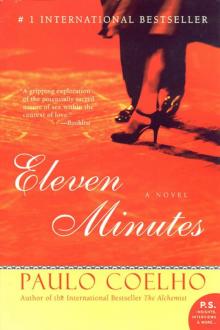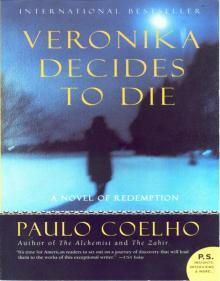- Home
- Paulo Coelho
Veronika Decides to Die: A Novel of Redemption Page 5
Veronika Decides to Die: A Novel of Redemption Read online
Page 5
She would soon be back home with her children and her husband, and that part of her life also had its charms. Of course it would be difficult to find work; after all, in a small town like Ljubljana news travels fast, and her internment in Villete was already common knowledge to many people. But her husband earned enough to keep the family, and she could use her free time to continue making her astral journeys, though not under the dangerous influence of insulin.
There was only one thing she did not want to experience again: the reason that had brought her to Villete.
Depression.
The doctors said that a recently discovered substance, serotonin, was one of the compounds responsible for how human beings felt. A lack of serotonin impaired one's capacity to concentrate at work, to sleep, to eat, and to enjoy life's pleasures. When this substance was completely absent, the person experienced despair, pessimism, a sense of futility, terrible tiredness, anxiety, difficulties in making decisions, and would end up sinking into permanent gloom, which would lead either to complete apathy or to suicide.
Other more conservative doctors said that any drastic change in life could trigger depression--moving to another country, losing a loved one, divorce, an increase in the demands of work or family. Some modern studies, based on the number of internments in winter and summer, pointed to the lack of sunlight as one of the causes of depression.
In Zedka's case, however, the reasons were simpler than anyone suspected: there was man hidden in her past, or rather, the fantasy she had built up about a man she had known a long time ago.
It was so stupid. Plunging into depression and insanity all because of a man whose current whereabouts she didn't even know, but with whom she had fallen hopelessly in love in her youth, since, like every normal young girl, Zedka had needed to experience the Impossible Love.
However, unlike her friends, who only dreamed of the Impossible Love, Zedka had decided to go further; she had actually tried to realize that dream. He lived on the other side of the ocean, and she sold everything to go and join him. He was married, but she accepted her role as mistress, plotting secretly to make him her husband. He barely had enough time for himself, but she resigned herself to spending days and nights in a cheap hotel room, waiting for his rare telephone calls.
Despite her determination to put up with everything in the name of love, the relationship did not work out. He never said anything directly, but one day Zedka realized that she was no longer welcome, and she returned to Slovenia.
She spent a few months barely eating and remembering every second they had spent together, reviewing again and again their moments of joy and pleasure in bed, trying to fix on something that would allow her to believe in the future of that relationship. Her friends were worried about the state she was in, but something in Zedka's heart told her it was just a passing phase; personal growth has its price, and she was paying it without complaint. And so it was: One morning she woke up with an immense will to live; for the first time in ages, she ate heartily and then went out and found a job. She found not only a job, but also the attentions of a handsome, intelligent young man, much sought after by other women. A year later she was married to him.
She aroused both the envy and the applause of her girlfriends. The two of them went to live in a comfortable house, with a garden that looked over the river that flows through Ljubljana. They had children and took trips to Austria or Italy during the summer.
When Slovenia decided to separate from Yugoslavia, he was drafted into the army. Zedka was a Serb--that is, the enemy--and her life seemed on the point of collapse. In the ten tense days that followed, with the troops prepared for confrontation, and no one knowing quite what the result of the declaration of independence would be and how much blood would have to be spilled because of it, Zedka realized how much she loved him. She spent the whole time praying to a God who, until then, had seemed remote, but who now seemed her only hope. She promised the saints and angels anything as long as she could have her husband back.
And so it was. He came back, the children were able to go to the school where they taught the Slovene language, and the threat of war shifted to the neighboring republic of Croatia.
Three years had passed. Yugoslavia's war with Croatia moved to Bosnia, and reports began to circulate of massacres committed by the Serbs. Zedka thought it unjust to label a whole nation as criminals because of the folly of a few madmen. Her life took on a meaning she had never expected. She defended her people with pride and courage, writing in newspapers, appearing on television, organizing conferences. None of this bore any fruit, and even today foreigners still believe all the Serbs were responsible for those atrocities, but Zedka knew she had done her duty, and that she could not abandon her brothers and sisters at such a difficult time. She could count on the support of her Slovene husband, of her children, and of people who were not manipulated by the propaganda machines of either side.
One evening, she walked past the statue of Preseren, the great Slovene poet, and she began to think about his life. When he was thirty-four, he went into a church and saw an adolescent girl, Julia Primic, with whom he fell passionately in love. Like the ancient minstrels, he began to write her poems, in the hope of one day marrying her.
It turned out that Julia was the daughter of an upper middle-class family, and, apart from that chance sighting inside the church, Preseren never again managed to get near her. But that encounter inspired his finest poetry and created a whole legend around his name. In the small central square of Ljubljana, the statue of the poet stares fixedly at something. If you follow his gaze, you will see, on the other side of the square, the face of a woman carved into the stone of one of the houses. That was where Julia had lived. Even after death Preseren gazes for all eternity on his Impossible Love.
And what if he had fought a little harder?
Zedka's heart started beating fast. Perhaps it was a presentiment of something bad, an accident involving one of her children. She raced back home only to find them watching television and eating popcorn.
The sadness, however, did not pass. Zedka lay down and slept for nearly twelve hours, and when she woke she didn't feel like getting up. Preseren's story had brought back to her the image of her lost lover, who had never again contacted her.
And Zedka asked herself: Did I fight hard enough? Should I have accepted my role as mistress, rather than wanting things to go as I expected them to? Did I fight for my first love with the same energy with which I fought for my people?
Zedka persuaded herself that she had, but the sadness would not go away. What once had seemed to her a paradise--the house near the river, the husband whom she loved, the children eating popcorn in front of the television--was gradually transformed into a hell.
Today, after many astral journeys and many encounters with highly evolved beings, Zedka knew that this was all nonsense. She had used her Impossible Love as an excuse, a pretext for breaking the ties with the life she led, which was far from being the life she really expected for herself.
But twelve months earlier, the situation had been quite different: She began frantically looking for that distant lover, she spent a fortune on international phone calls, but he no longer lived in the same city, and it was impossible to find him. She sent letters by express mail, which were always returned. She phoned all his friends, but no one had any idea what had happened to him.
Her husband was completely unaware of what was going on, and that infuriated her, because he should at least have suspected something, made a scene, complained, threatened to put her out in the street. She became convinced that the international telephone operators, the postman, and all her girlfriends had been bribed by him to pretend indifference. She sold the jewelry that had been given to her when she married and bought a plane ticket to the other side of the ocean, until someone managed to convince her that America was a very large place and there was no point going there if you didn't know quite what you were looking for.
One evening she lay
down, suffering for love as she had never suffered before, not even when she had come back to the awful day-to-day life of Ljubljana. She spent that night and the following two days in her room. On the third day her husband--so kind, so concerned about her--called a doctor. Did he really not know that Zedka was trying to get in touch with the other man, to commit adultery, to exchange her life as a respected wife for life as someone's secret mistress, to leave Ljubljana, her home, her children forever?
The doctor arrived. She became hysterical and locked the door, only opening it again when the doctor had left. A week later, she no longer had sufficient strength of will to get out of bed and began to use the bed as a toilet. She did not think anymore; her head was completely taken up by fragmentary memories of the man, who, she was convinced, was also unsuccessfully looking for her.
Her infuriatingly generous husband changed the sheets, smoothed her hair, said that it would all be all right in the end. The children no longer came into her bedroom, not since she had slapped one of them for no reason, and then knelt down, kissed his feet, begging forgiveness, tearing her nightgown into shreds in order to show her despair and repentance.
After another week, in which she spat out the food offered to her, drifted in and out of reality several times, spent whole nights awake and whole days asleep, two men came into her room without knocking. One of them held her down while the other gave her an injection, and she woke up in Villete.
"Depression," she heard the doctor say to her husband. "Sometimes it's provoked by the most banal things, for example, the lack of a chemical substance, serotonin, in the organism."
From the ceiling in the ward, Zedka watched the nurse approaching, syringe in hand. The girl was still standing there, trying to talk to her body, terrified by her vacant gaze. For some moments Zedka considered the possibility of telling her about everything that was happening, but then she changed her mind; people never learn anything by being told; they have to find out for themselves.
THE NURSE placed the needle in Zedka's arm and injected her with glucose. As if grabbed by an enormous arm, her spirit left the ceiling, sped through a dark tunnel and returned to her body.
"Hello, Veronika."
The girl looked frightened.
"Are you all right?"
"Yes, I'm fine. Fortunately, I've managed to survive this dangerous treatment, but it won't be repeated."
"How do you know? Here no one respects the patient's wishes."
Zedka knew because, during her astral journey, she had gone to Dr. Igor's office.
"I can't explain why, I just know. Do you remember the first question I ever asked you?"
"Yes, you asked me if I knew what being crazy meant."
"Exactly. This time I'm not going to tell you a story. I'll just say that insanity is the inability to communicate your ideas. It's as if you were in a foreign country, able to see and understand everything that's going on around you but incapable of explaining what you need to know or of being helped, because you don't understand the language they speak there."
"We've all felt that."
"And all of us, one way or another, are insane."
Outside the barred window, the sky was thick with stars, and the moon, in its first quarter, was rising behind the mountains. Poets loved the full moon; they wrote thousands of poems about it, but it was the new moon that Veronika loved best because there was still room for it to grow, to expand, to fill the whole of its surface with light before its inevitable decline.
THAT NIGHT she felt like going over to the piano in the living room, and celebrating that night with a lovely sonata she had learned at school. Looking up at the sky, she had an indescribable sense of well-being, as if the infinite nature of the universe had revealed her own eternity to her. She was separated, however, from her desire by a steel door and a woman who was always, endlessly reading a book. Besides, no one played the piano at that hour of night; she would wake up the whole neighborhood.
Veronika laughed. The "neighborhood" were the wards full of crazy people, and those crazy people were, in turn, full of drugs to make them sleep.
Her sense of well-being continued, though. She got up and went over to Zedka's bed, but she was sound asleep too, perhaps recovering from the horrible experience she had been through.
"Go back to bed," said the nurse. "Good girls should be dreaming of angels or lovers."
"Don't treat me like a child. I'm not some tame madwoman who's afraid of everything; I'm raving, hysterical, I don't even respect my own life, or the lives of others. Anyway, today I feel more vigilant. I've looked at the moon, and I need to talk to someone."
The nurse looked at her, surprised by her reaction.
"Are you afraid of me?" asked Veronika. "In a couple of days' time I'll be dead; what have I got to lose?"
"Why don't you go for a walk, dear, and let me finish my book?"
"Because this is a prison, and there's a prison warden pretending to read a book, just to make others think she's an intelligent woman. The fact is, though, that she's watching every movement in the ward, and she guards the keys to the door as if they were a treasure. It's all in the regulations, and so she must obey them. That way she can pretend to have an authority she doesn't have in her everyday life, with her husband and children."
Veronika was trembling without quite knowing why.
"Keys?" said the nurse. "The door is always open. You don't think I'd stay locked up in here with a load of mental patients, do you?"
What does she mean the door's open? A few days ago I wanted to get out of here, and this woman even went with me to the toilet. What is she talking about?
"Don't take me too seriously," said the nurse. "The fact is we don't need a lot of security here, because of the sedatives we dole out. You're shivering, are you cold?"
"I don't know. I think it must have something to do with my heart."
"If you like, you can go for a walk."
"What I'd really like is to play the piano."
"The living room is quite separate, so your piano playing won't disturb anyone. Do what you like."
Veronika's trembling changed into low, timid, suppressed sobs. She knelt down, laid her head on the woman's lap, and cried and cried.
The nurse put down the book and stroked Veronika's hair, allowing that wave of sadness and tears its natural expression. There they sat for almost half an hour, one crying, the other consoling, though neither knew why or what.
The sobbing finally ceased. The nurse helped her up, took her by the arm, and led her to the door.
"I've got a daughter your age. When you were first admitted, full of drips and tubes, I kept wondering why a pretty young girl, with her whole life ahead of her, should want to kill herself. Then all kinds of rumors started flying around: about the letter that you left behind, which I never believed could be the real motive, and how you didn't have long to live because of some incurable heart problem. I couldn't get the image of my own daughter out of my head: What if she decided to do something like that? Why do certain people try to go against the natural order of things, which is to fight for survival whatever happens?"
"That's why I was crying," said Veronika. "When I took the pills, I wanted to kill someone I hated. I didn't know that other Veronikas existed inside me, Veronikas that I could love."
"What makes a person hate themselves?"
"Cowardice, perhaps. Or the eternal fear of being wrong, of not doing what others expect. A few moments ago I was happy, I forgot I was under sentence of death; then, when I remembered the situation I'm in, I felt frightened."
The nurse opened the door, and Veronika went out.
How could she ask me that? What does she want, to understand why I was crying? Doesn't she realize I'm a perfectly normal person, with the same desires and fears as everyone else, and that a question like that, now that it's all too late, could throw me into panic?
As she was walking down the corridors, lit by the same faint light as in the ward, Veronika rea
lized that it was too late: She could no longer control her fear.
I must get a grip on myself. I'm the kind of person who sticks to any decision she makes, who always sees things through.
It's true that in her life she had seen many things through to their ultimate consequences, but only unimportant things, like prolonging a quarrel that could easily have been resolved with an apology, or not phoning a man she was in love with simply because she thought the relationship would lead nowhere. She was intransigent about the easy things, as if trying to prove to herself how strong and indifferent she was, when in fact she was just a fragile woman who had never been an outstanding student, never excelled at school sports, and had never succeeded in keeping the peace at home.
She had overcome her minor defects only to be defeated by matters of fundamental importance. She had managed to appear utterly independent when she was, in fact, desperately in need of company. When she entered a room everyone would turn to look at her, but she almost always ended the night alone, in the convent, watching a TV that she hadn't even bothered to have properly tuned. She gave all her friends the impression that she was a woman to be envied, and she expended most of her energy in trying to behave in accordance with the image she had created of herself.
Because of that she had never had enough energy to be herself, a person who, like everyone else in the world, needed other people in order to be happy. But other people were so difficult. They reacted in unpredictable ways, they surrounded themselves with defensive walls, they behaved just as she did, pretending they didn't care about anything. When someone more open to life appeared, they either rejected them outright or made them suffer, consigning them to being inferior, ingenuous.

 The Alchemist
The Alchemist Maktub
Maktub Like the Flowing River
Like the Flowing River The Winner Stands Alone
The Winner Stands Alone The Spy
The Spy By the River Piedra I Sat Down and Wept: A Novel of Forgiveness
By the River Piedra I Sat Down and Wept: A Novel of Forgiveness Eleven Minutes
Eleven Minutes Manuscript Found in Accra
Manuscript Found in Accra Warrior of the Light
Warrior of the Light Veronika Decides to Die: A Novel of Redemption
Veronika Decides to Die: A Novel of Redemption The Devil and Miss Prym: A Novel of Temptation
The Devil and Miss Prym: A Novel of Temptation The Valkyries: An Encounter With Angels
The Valkyries: An Encounter With Angels Brida: A Novel
Brida: A Novel Fifth Mountain: A Novel
Fifth Mountain: A Novel Adultery
Adultery Inspirations
Inspirations The Archer
The Archer The Witch of Portobello
The Witch of Portobello The Pilgrimage
The Pilgrimage The Zahir
The Zahir Brida
Brida The Fifth Mountain
The Fifth Mountain Like the Flowing River: Thoughts and Reflections
Like the Flowing River: Thoughts and Reflections Manual of the Warrior of Light
Manual of the Warrior of Light By The River Piedra I Sat Down & Wept
By The River Piedra I Sat Down & Wept The Supreme Gift
The Supreme Gift Aleph
Aleph Hippie
Hippie Witch of Portobello
Witch of Portobello The Devil and Miss Prym
The Devil and Miss Prym The Alchemist - 10th Anniversary Edition
The Alchemist - 10th Anniversary Edition The Valkyries
The Valkyries